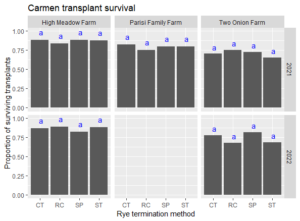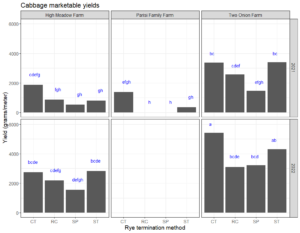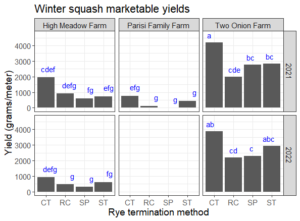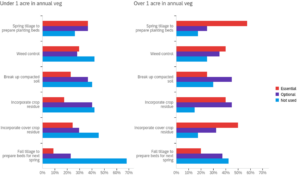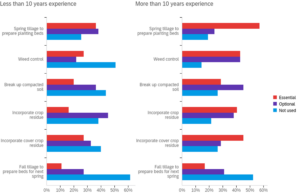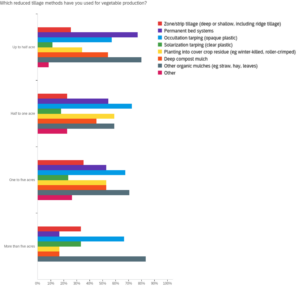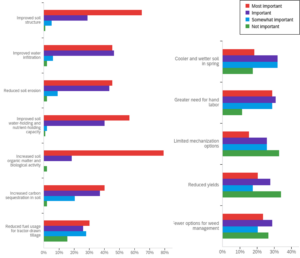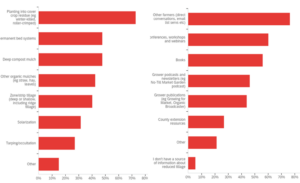Final report for LNC19-421
Project Information
Extreme weather events are becoming more frequent because of climate change. In the Upper Midwest, climate models predict increased frequency of heavy and prolonged rainfall events. Extreme rainfall erodes soil, interferes with timely fieldwork, and reduces crop yields. Increasing cover crops and reducing tillage are production strategies that keep soil in place, sustain and enhance soil health, and ultimately increase farm resilience. The project “Building resilience to extreme rainfall events: Cover crop-based reduced tillage strategies for diversified organic vegetable farms” will develop a farmer-led learning community focused on reducing tillage, facilitate data collection and sharing among farms that are experimenting with reduced tillage techniques, and will conduct a replicated on-farm trial using living aisles and testing cover crop termination techniques that are appropriate for organic systems and do not rely on tillage.
Conversations with organic vegetable farmers in our region confirm that while they are keenly aware of the damage tillage can do and have a strong interest in improving soil quality and water infiltration rates through reducing tillage, they are at a loss as to how to control weeds, terminate cover crops, and maintain vegetable yields without tillage. This proposal builds on their long-standing experience with cover crops to develop no-till techniques that can be used in rotation with crops like potatoes and carrots where soil disturbance will likely always be required, at least for harvest.
This project centers farmer expertise and innovation, supporting experimentation and facilitating peer learning through a farmer Community of Practice (CoP) focused on cover crop-based reduced tillage. The online farmer CoP will share strategies, approaches and outcomes of reduced tillage and cover cropping in vegetable production, and a group of farmer cooperators will track and share indicators of system resilience in their on-farm tests of reduced tillage. Through the CoP, we will produce case studies of how innovative vegetable farmers in the Upper Midwest are adapting to climate change and survey vegetable farmer knowledge, implementation and barriers to using reduced tillage strategies. We will partner with farmers to trial promising reduced tillage strategies for production of three different vegetable crops, emphasising cover crop termination techniques that preserve residues as mulch and are suitable for small scale organic farms, and producing regionally-relevant data to inform farmer decisions. Through this project, we will support and multiply the innovative potential of a community with intimate knowledge of the food production systems on which we all rely.
Farmer learning outcomes are increased knowledge of cover crop and reduced tillage strategies for small-scale, diversified organic vegetable production, how success of these strategies may be affected by multiple environmental and production factors, and familiarity with the equipment and skills needed to implement these strategies. Action outcomes are: increased farmer interactions through peer learning groups, greater experimentation with cover crop and reduced tillage strategies in vegetable production, and adoption of successful strategies. These outcomes will increase resilience to climate change and extreme weather events, increasing farm profitability, protecting environmental quality and natural resources, and improving farm community quality of life.
The impacts of climate change in the Upper Midwest are clear: climate is more variable and extreme weather events are more frequent. Average temperatures are rising at an accelerating rate, mostly impacting winter temperatures, and total average precipitation has increased. Increases in extreme rainfall events are clearly predicted from climate models for the Midwest, and both prediction and observation show increased frequency of heavy and prolonged rainfall events especially in spring. Obvious impacts on agriculture from increased extreme rainfall events include inundation of fields, soil erosion, and crop loss. Less obvious but significant impacts of extreme rainfall events include costly delays in field operations such as planting, weed management, and harvest, impacting overall labor needs and timing.
No-till and reduced tillage production methods and increased use of cover crops are recommended responses to limit damage to soil and crops from extreme rainfall. Row crop farmers in the Midwest have been adopting no-tillage systems and increasing cover crop use, with conventional producers relying largely on herbicides for cover crop termination, and organic producers beginning to adopt mechanical termination methods such as roller-crimping. Most studies of cover crop-based reduced tillage systems have focused on corn and other row crops, with few addressing vegetable production in such systems. Similarly, strategies and equipment for cover crop termination have been developed with a focus on row crops.
Our study aims to explore the impacts of reduced tillage on yield, and its benefits for crop resiliency in an understudied system: diversified and direct-marketed organic vegetables in the Upper Midwest. We will also introduce new technologies for small-scale cover crop management, including a roller crimper designed for walk-behind tractors (Kornecki, 2015). This project will establish on-farm trials of cover crop-based reduced tillage strategies for organic vegetables using high residue cover crops and incorporating perennial cover crops as rainfall infiltration strips and sources of organic mulch. Outreach activities will support farmers who are innovating strategies to manage extreme rainfall events. Peer-to-peer learning will encourage farmers to trial and adopt strategies to increase farm resilience. Increased adoption of reduced tillage methods will reduce soil loss from farmland and improve water quality and farmland ecosystem services. Greater resilience to climate change will improve profitability of diversified organic vegetable production and quality of life for organic vegetable farmers and rural communities.
Cooperators
- (Educator and Researcher)
- (Researcher)
- (Educator and Researcher)
Research
This project will establish on-farm trials of cover crop-based reduced tillage strategies for organic vegetables using high residue cover crops and incorporating perennial cover crops as rainfall infiltration strips. We hypothesize that different termination methods will have differential impacts on vegetable productivity and soil conditions.
Objective 1: Facilitate a farmer-led community of practice focused on resilience to extreme weather events in small scale diversified vegetable production
Building a farmer-led Community of Practice (CoP) focused on resilience to extreme weather events in small-scale diversified vegetable production is the primary project objective. The CoP will initially focus on cover crop use and reduced tillage in small scale diversified vegetable production, but farmer needs and interests centered around climate change, farming system resilience and economic, environmental and social sustainability will drive the topics covered.
The CoP will exist as an on-line and on-the-ground space for farmers to learn directly from their peers by sharing questions, ideas, strategies and skills (objective 1a). We will support a core group of farmers in testing new vegetable production strategies for resilience to extreme rainfall, with a focus on cover crops and reduced tillage (objective 1b). These on-farm tests will not constitute formal research, but will spark innovation in other CoP members, provide information for case studies for wider publication, and provide leads for future on-farm research into resilience to extreme weather in vegetable production. We will survey CoP members and other vegetable farmers for their knowledge, implementation, challenges and desire for information on cover crop-based reduced tillage strategies (objective 1c).
Objective 1a: Facilitate Community of Practice discussions and gatherings.
Farmer meetings and discussions initiated in 2018 brought together a group of organic vegetable farmers concerned about resilience to extreme weather resulting from climate change. This group will form the core of the CoP. The research team initiated discussions with farmers on the FairShare CSA Coalition listserve of over 300 farmers and agricultural professionals, met with approximately 40 farmers at the Organic Vegetable Production Conference in Madison WI, January 2019, and continued planning this proposal in email and phone conversations with farmers (see letters of support). We will build on these conversations through CoP planning meetings at the Organic Vegetable Production Conference and MOSES Organic Farming Conference in Jan and Feb 2020. At these planning meetings we will determine farmer priorities for resilience to extreme weather events, preferred communication modes for CoP, recruit new participants, and plan project field days and activities.
We anticipate that an email listserve or Google Group will be a suitable way for the CoP to communicate online, though other possibilities may emerge from farmer discussion. While the online space can be initially set up and managed by the research team, ideally the space will ultimately be managed by farmer members of the CoP, potentially through the FairShare CSA Coalition. Considerations for the online space will include: member privacy; content availability for searches by non-members; cost (no budget has been requested for this online space); and effects on farmer engagement of push content (eg email lists) versus pull content (eg discussion forums).
CoP discussions will form the basis for articles to be published in grower publications such as the MOSES Organic Broadcaster or Growing for Market magazine. Articles may include case studies of on-farm experiences with cover crop based reduced tillage (whether positive or negative), impacts of extreme rainfall or other extreme weather events on vegetable production, or summarize topics discussed in the CoP.
Field days will be at one of the three farms hosting replicated on-farm reduced tillage trials (see objective 2). Our initial field day will occur in early spring 2020. Since farmer turnout is likely to be lower in spring, we will video record the presentations to post online. At this field day, we will introduce the CoP and online discussion forum, and demonstrate indicators of soil health including: slake test for aggregate stability; water infiltration rate; water runoff and infiltration using an existing rainfall simulator; soil penetration resistance; and bulk density. We will share resources for soil quality evaluation including the USDA Soil Quality Test Kit Guide (https://www.nrcs.usda.gov/Internet/FSE_DOCUMENTS/nrcs142p2_050956.pdf). We will discuss plans for replicated on-farm trials (objective 2) and on-farm independent trials (objective 1b). Fall field days in 2020 and 2021 will include progress reports on on-farm reduced tillage trials for both researcher-managed replicated trials and farmer-managed independent trials. The final field day in fall 2022 will be promoted as a capstone event to the project at which we will present on all aspects of the project.
To increase engagement and share knowledge gained through the CoP, we will facilitate farmer-led workshops at the Organic Vegetable Production Conference in Jan 2021 and 2022. We will facilitate farmer roundtables at the MOSES Organic Farming Conference in Feb 2021 and 2022, and will present research and CoP outcomes as a farmer panel workshop or a research poster at MOSES 2022.
Objective 1b: Support farmer-led experimentation with cover crop-based reduced tillage strategies
Farmers involved in preliminary discussions about this project indicated interest in independent on-farm research, supported remotely by the research team. We will support a core group of six farmers in testing new vegetable production strategies for resilience to extreme rainfall events, with a focus on cover crops and reduced tillage. While these on-farm tests will not constitute formal research, they will build on a deep base of farmer knowledge of their farms and production systems, and are anticipated to provide leads for future on-farm research into resilience to extreme weather in vegetable production. Strategies to be tested will emerge from farmers’ personal research and CoP discussions. Strategies will be workshopped through phone conversations between farmers and researchers each spring, and although farms will run trials independently, we will seek opportunities to compare systems across sites or track system changes over time. Farmers are not expected to compare production systems side by side, but researchers will discuss the possibility to do so when practical.
Farmers will evaluate production strategies at least three times per season, both visually with photographs of production fields, and through qualitative ratings of system attributes. Strategies will be rated as better, worse, or similar to standard production strategies for the following attributes: yield; labor requirement; weed control; pest pressure; disease pressure; soil quality (as judged by farmer); and overall performance. Evaluation forms will include space for farmers to elaborate on system performance. Farmers will track tillage events by frequency and depth rating (deep, shallow, medium). Farmers will test soil aggregate stability with a slake test at the beginning and end of the season. Slake test results can be recorded visually with photographs at the beginning and end of the test. Farmers will also document field conditions through photographs after major rainfall events.
This core group of farmers will share findings from on-farm trials at field days, workshops and through on-line discussion forums. Several of these farmers, and others who will be identified through surveys and farmer networks, will be interviewed to develop case studies of on-farm innovations for climate change resilience. We anticipate that more farmers will participate to share their innovations and strategies for resilience to climate change and extreme rainfall as the learning community develops.
Objective 1c: Survey farmer knowledge, use and attitudes to cover crop-based reduced tillage strategies in vegetable production.
We will use a survey tool to assess knowledge, on-farm implementation, challenges and desire for information on cover crop-based reduced tillage strategies among diversified vegetable growers. We will seek feedback from core CoP members on a survey draft, revise the survey based on feedback, and begin survey distribution in January 2020 (pending Institutional Review Board approval).
The survey will be distributed to diversified vegetable farmers through email lists, the project website, at field days, conferences and workshops. While the survey will be anonymous, we will include a question to verify whether respondents are members of the CoP and the length of time that they have participated in the CoP. We will distribute the survey in Jan-Feb each year to evaluate changes in knowledge over the period of the project. Our goal will be a minimum of 100 usable responses, which represents a large proportion of the 922 organic vegetable producers in the North Central Region (USDA NASS 2016 Organic Survey figures). We will analyse survey responses by farmer demographics including organic or conventional production, years farming, location, and farm size. Changes in knowledge among CoP members will be evaluated against the background of changes in knowledge among the wider population of diversified vegetable farmers.
Objective 2: conduct collaborative on-farm research into cover crop-based reduced tillage strategies that integrate perennial and annual cover crops into diversified vegetable systems
Three farms in south central Wisconsin will host replicated trials of cover crop-based reduced tillage for production of cabbage, pepper and winter squash: Parisi Family Farms, Stoughton WI; High Meadow Farm, Johnson Creek WI; and Two Onion Farm, Belmont WI. Farmers and researchers will work together to establish production beds alternating with strips of a perennial grass-legume mix. Perennial strips will be planted in Fall 2019 with a perennial ryegrass-fescue-white clover mix, as this mix is low growing, easy to manage by mowing, and traffic-tolerant. These strips will be refreshed through overseeding if necessary in following seasons. Width of production beds and perennial strips may be slightly different at different farms depending on available equipment and preferred management styles. Production beds will be around 36-40 inches wide, with perennial strip width ranging more widely, from 20-60 inches, depending on farmer mowing equipment and desire to experiment with mulch production from perennial beds. Soil samples will be taken from the research plot area in Fall 2019 for soil texture analysis, routine nutrient analysis (P, K, pH) and organic matter analysis.
Production beds will be planted with a rye/vetch cover crop each fall and fertility amendments indicated by soil tests will be applied at this time. Four treatments for cover crop termination will be tested using a randomized split block design with three replications: conventional tillage (CT), no-till roller crimper (RC), no-till sickle bar mowing (SM) and no-till occultation with silage plastic (SP). Treatments will be applied at rye anthesis (early May) to maximize termination rates. Established plots will receive the same management treatments every year and vegetable crops will be rotated among beds in the sequence peppers-cabbage-winter squash. A new roller crimper, compatible with walk-behind tractors and designed specifically for cover crop management on small farms by Dr. Ted Kornecki from the USDA Soil Dynamics Lab, will be used for the RC treatment. A 30” wide sickle bar mower, compatible with walk-behind tractors, will be provided by researchers, unless the farmer prefers to use their own sickle bar mower. We will evaluate cover crop termination rates 2 weeks and 4 weeks after treatment.
Vegetable plots will be 15-25 feet in length (depending on field dimensions) with a single row of plants at 18” spacing. Peppers and winter squash will be planted 2 weeks after cover crop termination (mid-late May), and cabbage will be planted in early July. Vegetable cultivars will be chosen in consultation with farmers but a bush-type winter squash such as Honey Bear will be chosen to allow mowing of living aisles. Transplants will be punch planted by hand into all treatments and a pint of compost will be added to the planting hole. Plots will be irrigated with drip line.
Weed pressure will be recorded for each plot as a population count per square foot at ground level. We will record all labor hours for plot management. Soil temperature and moisture will be tracked using existing equipment. Crop petioles will be sampled for tissue analysis at recommended sampling times (once per season) to evaluate plant nutrition. Petioles for the most recently matured leaf from each plant will be bulked by plot, and will be shipped to the University of Wisconsin Soil and Forage Lab following recommendations for sample handling. In October after completion of harvest, we will assess soil aggregate stability (slake test), bulk density, and water infiltration for each plot following methods in the USDA Soil Quality Test Kit Guide (https://www.nrcs.usda.gov/Internet/FSE_DOCUMENTS/nrcs142p2_050956.pdf). We will harvest peppers 6 times between August and September and will harvest cabbage and winter squash in October. Harvest data will include marketable and unmarketable weight and count, and causes of unmarketability. We will analyze data from harvests, soil indicators, weed counts, tissue testing and labor hours to evaluate costs and benefits of treatments for different vegetable crops.
Objective 1: Facilitate a farmer-led community of practice focused on resilience to extreme weather events in small scale diversified vegetable production
See "Project Activities" section for outcomes of this objective.
Objective 2: conduct collaborative on-farm research into cover crop-based reduced tillage strategies that integrate perennial and annual cover crops into diversified vegetable systems
In 2019-2020, we contracted with a machine shop in La Farge, Wisconsin (Brush Hollow Fabrication) to construct a 3-foot wide roller crimper compatible with a Grillo or BCS walk-behind tractor, using plans provided by Dr. Ted Kornecki, USDA-ARS Soil Dynamic Lab. This roller-crimper has been used in our on-farm and research station trials of winter rye termination. We prepared a 2 page bulletin describing initial tests of the crimper for distribution at conferences in early 2021: Small scale roller crimper.
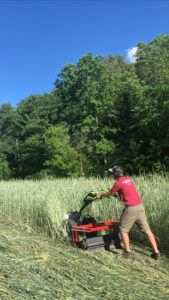
On-farm trial establishment 2019-2020
On-farm trial plots were established in fall 2019 at Two Onion Farm (TOF), Parisi Family Farm (PFF) and High Meadows Farm (HMF). Perennial living aisles were planted with a perennial ryegrass (30 lb/A) and white clover (19 lb/A) mix, and production beds were planted with a winter rye (180 lb/A) and hairy vetch (40 lb/A) mix. At all farms, production beds were 36" wide. At TOF and HMF, living aisles were 48" wide while at PFF, aisles were 24" wide, to accommodate the scale of the available mowing equipment. In spring and summer 2020, UW-Madison restrictions on travel for research due to COVID-19 prevented researchers from carrying out on-farm trials of cover crop termination, living aisle management, and vegetable production. Based on photographs and comments provided by farmers, stand establishment was fair to good in living aisles, and good in production beds. In fall 2020, farmers mowed the trial plots ahead of rye seeding.
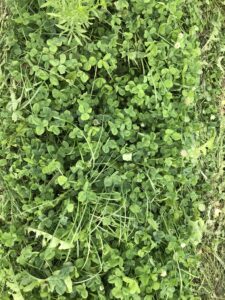
Cover crop establishment, termination, and vegetable transplanting
Winter rye was hand-broadcast into production beds each fall ahead of vegetable trials. Rye was seeded at a rate of 180 lb/A across a 3 foot width for reduced tillage treatments and across a 5 foot width for the conventional tillage treatment and worked in using a Grillo walk-behind tractor and tiller attachment.
Four separate treatments were implemented to terminate the rye cover crop in production beds. For the conventional tillage treatment, the rye cover was mowed before tillage of a 5-foot swath with a tractor-drawn rototiller (TOF and HMF) or with a Grillo walk-behind tractor and rototiller (PFF). For the strip tillage treatment, the rye cover was mowed before tillage of a 3-foot swath with a Grillo walk-behind tractor and rototiller. Tillage was repeated at least twice before planting. For the occultation treatment, the rye cover was rolled down using a large barrel (TOF and PFF) or using a brush mower with the blade disengaged (HMF) and silage plastic was secured across the 3-foot wide planting bed using soil staples. Silage plastic was in place for three weeks before planting peppers and winter squash, and for six weeks before planting cabbage. For the roller crimper treatment, the rye cover was terminated using the roller crimper implement described above, one-two weeks past anthesis when the rye was at the milk to soft dough stage. Dates of field operations are shown in Table One.
Table One: Dates of field operations for on-farm trials of reduced tillage
|
Field operation |
Treatment |
Crop |
Date(s) |
|
Winter rye seeding |
All |
NA |
9/18/20 (all farms) 9/8/21 (TOF) 10/4/21 (PFF, HMF) |
|
Biomass sampling and cover crop termination |
Conventional tillage (CT) Strip tillage (ST) Silage plastic occultation (SP) |
NA |
5/25/21 (TOF, PFF), 5/27/21 (HMF) 5/25/22 (PFF) 5/31/22 (TOF, HMF) |
|
Biomass sampling and cover crop termination |
Roller crimper (RC) |
NA |
6/1/21 (all farms) 6/7/22 (TOF, HMF) 6/13/22 (PFF) |
|
Planting |
All |
Pepper, winter squash Note: PFF plots were not planted to vegetables in 2022 |
6/15/21 (TOF, PFF) 6/17/21 (HMF) 6/14/22 (TOF) 6/16/22 (SP and RC plots at HMF) 6/20/22 (CT and ST plots at HMF) |
|
Rye straw mulching |
Occultation, roller crimper |
All |
6/15/21 (TOF, PFF) 6/17/21 (HMF) Not done in 2022 |
|
Planting |
All |
Cabbage |
7/6/21 (TOF) 7/8/21 (PFF, HMF) 7/6/22 (TOF) 7/8/22 (HMF) |
|
Harvest |
All |
Pepper |
8/17/21-10/4/21 8/30/22-10/4/22 |
|
Harvest |
All |
Winter squash |
9/7/21-10/4/21 9/27/22 (TOF) 9/22/22 (HMF) |
|
Harvest |
All |
Cabbage |
9/28/21 (TOF) 10/4/21 (PFF, HMF) 9/20/22 (TOF) 9/22/22 (HMF) |
Biomass samples were collected from each plot immediately before cover crop termination. One sample was collected per plot by cutting all plant material within a 1-by-1 foot quadrat at ground level. Plant material was separated into rye and non-rye categories before drying and weighing. Since a number of plots at all farms had less rye biomass than the target of 10000 lb/A (Figure 1), plots for occultation and roller crimper treatments, for which treatment success depends on sufficient biomass, were supplemented in mid-June 2021 with additional rye straw to meet the 10000 lb/A target. The rye stand at PFF was especially poor, potentially due to low soil fertility.
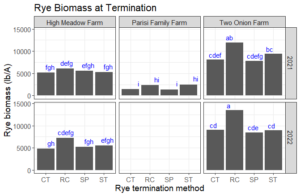
Vegetable transplants for peppers (Carmen), winter squash (Bush Delicata), and cabbage (Storage #4) were purchased from a local organic farm and planted by hand as single rows in production beds with 18 inch spacing between plants. Transplants were watered by hand immediately after planting and irrigated by drip irrigation as needed through the season (by farmers). One pint of composted dairy manure was added to the planting hole for each transplant and pelleted composted poultry manure and feathermeal were applied to provide adequate nutrition for each crop as suggested by soil tests at each site (Table Two). In response to lower vegetable yields from silage plastic-occulted and roller-crimped plots in 2021, plots were supplemented with feathermeal in spring 2022 in an attempt to compensate for nitrogen tied up in rye cover crop residue. Feathermeal additions were calculated based on cover crop biomass measures from these plots and cover crop nutrient removal, estimated for rye straw at 8.6 lb per ton (Fertilizer Recommendations for Field Crops in Michigan, Christenson, et al. 1992).
Table Two: Nitrogen, phosphorus, and potassium supplied by fertility amendments (pelleted composted chicken manure and feathermeal) at each farm. Customized amendments in 2022 are indicated by treatment code (CT = conventionally tilled, ST = strip tilled, SP = silage plastic-occulted, RC = roller crimped).
|
Year |
Farm |
Crop |
N (lb/A) |
P2O5 (lb/A) |
K2O (lb/A) |
|
2021 |
HMF |
Cabbage |
140 |
10 |
70 |
|
Pepper |
80 |
5 |
50 |
||
|
Winter squash |
60 |
20 |
90 |
||
|
PFF |
Cabbage |
140 |
70 |
140 |
|
|
Pepper |
80 |
65 |
120 |
||
|
Winter squash |
60 |
95 |
160 |
||
|
TOF |
Cabbage |
140 |
0 |
0 |
|
|
Pepper |
80 |
0 |
0 |
||
|
Winter squash |
60 |
0 |
0 |
||
|
2022 |
HMF |
Cabbage (CT, ST) |
140 |
15 |
140 |
|
Pepper (CT, ST) |
80 |
10 |
120 |
||
|
Winter squash (CT, ST) |
60 |
40 |
160 |
||
|
Cabbage (SP) |
162 |
25 |
194 |
||
|
Pepper (SP) |
102 |
20 |
174 |
||
|
Winter squash (SP) |
82 |
50 |
214 |
||
|
Cabbage (RC) |
171 |
28 |
216 |
||
|
Pepper (RC) |
111 |
23 |
196 |
||
|
Winter squash (RC) |
91 |
53 |
236 |
||
|
TOF |
Cabbage (CT, ST) |
140 |
0 |
0 |
|
|
Pepper (CT, ST) |
80 |
0 |
0 |
||
|
Winter squash (CT, ST) |
60 |
0 |
0 |
||
|
Cabbage (SP) |
177 |
16 |
89 |
||
|
Pepper (SP) |
117 |
16 |
89 |
||
|
Winter squash (SP) |
97 |
16 |
89 |
||
|
Cabbage (RC) |
198 |
25 |
141 |
||
|
Pepper (RC) |
138 |
25 |
141 |
||
|
Winter squash (RC) |
118 |
25 |
141 |
Across four weeks post-planting, transplants were replaced as needed, but transplant survival was reduced for some treatments (Figure 2). This was particularly notable for cabbage and winter squash in the roller crimper (RC) and occultation (SP) treatments at PFF, and to a lesser extent at TOF. Winter squash transplants in these treatments showed symptoms of damping-off in 2021 and bacterial wilt in 2022, while cabbage transplants were potentially killed by herbivore damage.
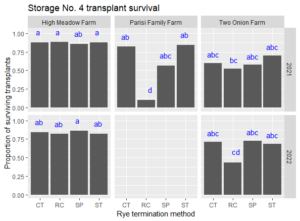
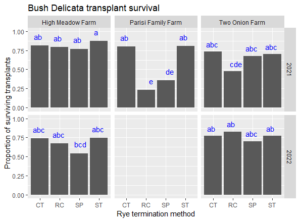
Figure 2: Proportion of transplant survival for cabbage (Storage No. 4), winter squash (Bush Delicata) and pepper (Carmen) in cover crop termination treatments at three farms. Treatments are: conventional tillage (CT), roller crimper (RC), occultation with silage plastic (SP) and strip tillage (ST). Vegetables were not planted at PFF in 2022.
For the first four weeks after planting, plots were weeded using wheel- and hand-hoes for the tillage treatments, and by hand for the occultation and roller crimper treatments. Labor data for cover crop termination and vegetable crop production was collected at each farm (Table Three).
Table Three: Labor requirements for cover crop termination and planting of vegetable crops at three farms in 2021 and 2022. Time period is between late May and mid-June, and labor is expressed as minutes to manage a 100-foot length of a 3-foot wide production bed. Total time is expressed in hours. Cover crop termination methods are CT = conventionally tilled, ST = strip tilled, RC = roller crimped, SP = silage plastic occulted.
|
|
|
|
Time required (minutes) |
|
|||
|
Farm |
Year |
Rye termination method |
Cover crop termination |
Bed preparation |
Planting |
Weed barrier |
Total time (hr) |
|
HMF |
2021 |
CT |
6.2 |
15.4 |
39.1 |
1.0 |
|
|
ST |
6.1 |
4.9 |
43.1 |
0.9 |
|||
|
RC |
3.4 |
156.3 |
107.5 |
104.4 |
6.2 |
||
|
SP |
39.1 |
135.7 |
105.1 |
4.7 |
|||
|
2022 |
CT |
14.2 |
0.9 |
29.3 |
|
0.7 |
|
|
ST |
12.7 |
0.8 |
30.7 |
|
0.7 |
||
|
RC |
6.7 |
2.6 |
31.0 |
54.5 |
1.6 |
||
|
SP |
22.1 |
27.6 |
31.1 |
|
1.3 |
||
|
PFF |
2021 |
CT |
10.4 |
45.8 |
43.1 |
|
1.7 |
|
ST |
6.4 |
43 |
45.8 |
|
1.6 |
||
|
RC |
3.7 |
89.8 |
94.4 |
78.6 |
4.4 |
||
|
SP |
41.1 |
160.1 |
87 |
|
4.8 |
||
|
TOF |
2021 |
CT |
5.3 |
73.2 |
41.6 |
|
2.0 |
|
ST |
5.8 |
41.3 |
42.5 |
|
1.5 |
||
|
RC |
3.8 |
85.2 |
113.3 |
96.3 |
5.0 |
||
|
SP |
43.3 |
194.2 |
80.8 |
|
5.3 |
||
|
2022 |
CT |
8.5 |
4.6 |
26.9 |
0.0 |
0.7 |
|
|
ST |
11.9 |
3.3 |
28.0 |
0.0 |
0.7 |
||
|
RC |
16.5 |
4.9 |
40.6 |
48.5 |
1.8 |
||
|
SP |
25.0 |
46.4 |
34.1 |
0.0 |
1.8 |
||
Cover crop termination labor requirements were relatively similar for conventional and strip tillage treatments and roller-crimping, but laying silage plastic for occultation was time-consuming. Time required in 2022 is more indicative of actual time requirements since our methods were more efficient after the first year; however, a mechanized plastic layer system could reduce the time requirement further. Rye cover crop termination included mowing (for tilled treatments), rolling and tarping (for silage plastic-occulted treatments) or roller-crimping. Bed preparation included tillage in conventionally tilled and strip-tilled plots and removal of silage plastic for the occultation treatment. In 2021, intensive hand-weeding was required in silage plastic-occulted and roller-crimped plots before planting, due to the relatively poor rye stand, and weeding through the rye debris was slow and inefficient. In 2022, hand-weeding requirements were considerably lower in the roller crimper treatments but still high in the silage plastic-occulted treatment. Planting into reduced tillage beds was slower than into tillage treatments, especially in 2021 as we refined our methods. Planting holes were initially made using a drill and soil auger, but when the drill failed towards the end of 2021 planting at HMF, we found that a hori hori or soil knife was equally effective, and we used this method exclusively in 2022. In 2021, weed barriers were added to the roller-crimped plots due to inadequate suppression of perennial weeds by sparse stands of rye cover crops: landscape fabric strips at HMF, silage plastic strips at TOF, and rye straw at PFF. This practice was repeated in 2022 at HMF and TOF to maintain comparability across years, while vegetables were not produced at PFF in 2022.
Overall, labor requirements to establish the silage plastic-occulted and roller-crimper treatments were higher than for tillage treatments, largely due to the labor requirements of pre-plant weed management in addition to the learning curve for efficient installation of silage plastic. However, the change between 2021 and 2022 in labor requirements for the no-till treatments is notable, and likely due to the intensive hand weed management in 2021 and suppression of weed growth in roller-crimped plots by addition of a fabric or plastic weed barrier as well as greater field crew efficiency for silage plastic installation. Additionally, a stronger rye stand was obtained at TOF for reduced tillage plots (which had an extra week of growth compared to other treatments) in spring 2022 and this would be expected to contribute to weed suppression.
Weed Management
At all farms in 2021, weed populations were highest in conventionally-tilled or strip-tilled plots (CT and ST) in the week after planting (Figure 3); however these weeds were relatively easy to control using wheel or hand hoes (Table Three). While weed numbers were comparatively low in plots for which the rye cover crop was terminated by silage plastic occultation (SP) or roller crimping (RC), weeding was more time consuming in these plots due to the need to hand pull weeds through the dense mat of rye residue. As described above, roller crimped (RC) treatments were supplemented with additional rye straw (PFF, 2021), landscape fabric strips (HMF, both years) or silage plastic strips (TOF, both years) due to rye biomass being lower than ideal for weed suppression and due to the high population of perennial weeds at all farms. Weed counts were not recorded for roller-crimped plots at TOF and HMF after rescue treatments were implemented since there was no longer a sufficient area to use the 1-foot quadrat, and landscape fabric and silage plastic covers effectively prevented weed emergence. While weed control in silage plastic-occulted plots (SP) was comparable to other treatments at the end of the 2021 season, weed populations in this treatment were slightly higher through much of the 2022 season at both HMF and TOF, largely due to spread of thistle and quack grass, both perennial weeds difficult to control in reduced tillage systems.
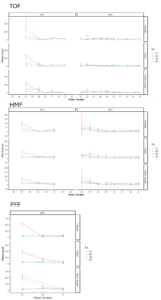
Table Four: Labor requirements for weed management of vegetable crops at three farms in 2021 and 2022, separated by crop and cover crop termination method. Labor is expressed as minutes to manage a 100-foot length of a 3-foot wide production bed. Total weeding time is expressed in hours. Cover crop termination methods are CT = conventionally tilled, ST = strip tilled, RC = roller crimped, SP = silage plastic occulted.
| Farm | Year | Crop | Treatment | late June | July | August | Total (hr) |
| HMF | 2021 | cab | CT | 3.8 | 7.7 | 11.5 | |
| RC | 5.7 | 9.9 | 15.6 | ||||
| SP | 12.2 | 20.0 | 32.2 | ||||
| ST | 2.4 | 8.5 | 10.9 | ||||
| pep | CT | 11.5 | 6.6 | 18.1 | |||
| RC | 25.9 | 6.5 | 32.4 | ||||
| SP | 27.9 | 12.8 | 40.8 | ||||
| ST | 10.3 | 9.7 | 20.0 | ||||
| wsq | CT | 12.3 | 12.7 | 25.1 | |||
| RC | 38.5 | 9.0 | 47.5 | ||||
| SP | 34.3 | 26.3 | 60.7 | ||||
| ST | 10.5 | 10.8 | 21.3 | ||||
| 2022 | cab | CT | 13.2 | 9.3 | 26.8 | ||
| RC | 2.5 | 0.0 | 23.1 | ||||
| SP | 59.5 | 24.9 | 105.5 | ||||
| ST | 12.1 | 10.1 | 25.7 | ||||
| pep | CT | 4.7 | 19.9 | 8.8 | 33.4 | ||
| RC | 14.5 | 22.5 | 0.0 | 37.0 | |||
| SP | 12.2 | 95.1 | 35.0 | 142.2 | |||
| ST | 4.4 | 18.3 | 10.8 | 33.6 | |||
| wsq | CT | 4.0 | 31.5 | 6.8 | 42.4 | ||
| RC | 12.1 | 20.8 | 0.0 | 32.8 | |||
| SP | 8.8 | 95.9 | 29.0 | 133.7 | |||
| ST | 4.1 | 32.3 | 13.3 | 49.7 | |||
| PFF | 2021 | cab | CT | 7.4 | 6.6 | 14.0 | |
| RC | 46.1 | 7.3 | 53.4 | ||||
| SP | 12.1 | 35.7 | 47.8 | ||||
| ST | 2.9 | 6.9 | 9.8 | ||||
| pep | CT | 19.9 | 9.4 | 29.3 | |||
| RC | 123.2 | 6.1 | 129.3 | ||||
| SP | 27.5 | 33.2 | 60.7 | ||||
| ST | 18.2 | 10.5 | 28.6 | ||||
| wsq | CT | 19.3 | 14.0 | 33.3 | |||
| RC | 93.6 | 9.0 | 102.6 | ||||
| SP | 24.9 | 29.4 | 54.3 | ||||
| ST | 19.5 | 11.2 | 30.7 | ||||
| TOF | 2021 | cab | CT | 4.8 | 13.8 | 18.6 | |
| RC | 11.9 | 15.4 | 27.3 | ||||
| SP | 14.5 | 43.0 | 57.6 | ||||
| ST | 6.1 | 18.8 | 24.9 | ||||
| pep | CT | 20.4 | 11.1 | 31.6 | |||
| RC | 31.3 | 18.3 | 49.6 | ||||
| SP | 31.0 | 30.2 | 61.2 | ||||
| ST | 24.0 | 17.5 | 41.4 | ||||
| wsq | CT | 25.8 | 5.4 | 31.2 | |||
| RC | 31.7 | 12.5 | 44.2 | ||||
| SP | 28.6 | 26.6 | 55.2 | ||||
| ST | 26.8 | 12.9 | 39.6 | ||||
| 2022 | cab | CT | 20.2 | 6.4 | 33.3 | ||
| RC | 15.8 | 0.0 | 44.7 | ||||
| SP | 67.5 | 27.5 | 137.2 | ||||
| ST | 18.8 | 8.5 | 31.2 | ||||
| pep | CT | 9.7 | 31.6 | 6.0 | 47.3 | ||
| RC | 13.5 | 15.9 | 0.0 | 29.4 | |||
| SP | 13.5 | 69.7 | 33.0 | 116.1 | |||
| ST | 8.0 | 28.9 | 4.5 | 41.3 | |||
| wsq | CT | 7.1 | 48.2 | 18.8 | 74.2 | ||
| RC | 11.7 | 17.3 | 0.0 | 28.9 | |||
| SP | 14.2 | 83.5 | 38.6 | 136.3 | |||
| ST | 8.5 | 40.2 | 14.9 | 63.6 |
Early weed management in tillage treatments used the walk-behind tractor and rototiller or wheel hoe beside plants, and hand hoes between plants. For the silage plastic-occulted and roller-crimper treatments, hand weeding was necessary and time-consuming (Table Four). In 2021, high weed pressure in the roller-crimped plots was quickly apparent, partially due to the poor rye cover crop stand but also due to the high incidence of perennial weeds, including thistle and quack grass, at all three farms. While these weeds were most likely already present in fields in 2019, the pandemic-enforced lack of management beyond mowing in 2020 probably contributed to their spread. We trialed different methods of “rescuing” the roller-crimper treatment at each farm. At TOF, silage plastic was used to cover the sides of the roller-crimped plots, leaving a narrow strip of 4-6 inches down the center of the bed. A similar approach was used at HMF, with landscape fabric instead of silage plastic. At both locations, the physical weed barrier minimized weeding needed to the narrow planting strip. At PFF, roller-crimped plots were supplemented with rye straw at a rate of 10000 lb/A, but this did not effectively suppress the large population of thistle and quack grass which required extensive weeding. Silage plastic-occulted plots showed initial suppression of weeds, but after 3-4 weeks, weed pressure increased in these plots. In 2022, increasing populations of perennial weeds were noticeable in silage plastic-occulted plots at both HMF and TOF leading to increased time spent weeding.
Harvest
For all crops, produce weight and number was recorded for marketable and unmarketable categories, and the top three causes of unmarketability were recorded. The total marketable yield by weight per plant for the 2021 season is shown in Figure 3. Peppers were harvested weekly when more than 50% red, or if the fruit was evidently not marketable (eg blemished, rotting). Winter squash were harvested on two dates in 2021 to capture possible differences in crop maturity between treatments, but no significant maturity differences were noted so in 2022, winter squash was harvested on a single date. Cabbage was harvested on a single date. For the final pepper harvest, full-size green fruit were harvested and yields recorded as a separate category, included in total marketable weight per plant (Figure 4). Harvest data is presented on a per-meter basis to account for variable plant survival rates.
Several notable pest and disease issues were encountered in both years. Squash borer and squash bugs caused extensive damage to squash plants at all farms, and while pest numbers were not evaluated, squash bug numbers seemed higher in plots with more rye residue. At HMF, insect damage to green peppers was widespread and may have led to extensive rotting of ripening produce. In 2022, we were able to identify common stalk borer as a causal pest for this damage. For two dates in 2021 on which insect damage and rot was most significant in peppers at HMF, weights and numbers of unmarketable peppers with insect damage and rot were compared to determine if any cover crop treatments were more susceptible, but no significant differences were seen. At the same farm, cabbage loopers damaged cabbage wrapper leaves. This damage was not considered in categorizing cabbages as marketable.

Performance of reduced tillage systems based on yield varied across farms and crops, but in general plants in conventional tillage systems were more productive. Pepper yields for strip-tilled plots at TOF in 2021 and at HMF in 2022 approached yields for conventionally-tilled plots. Similarly, winter squash yields in strip-tilled plots at both farms in 2022, and for cabbage at TOF in 2021 and both farms in 2022 approached yields for conventionally-tilled plots.
Soil Function Measures
Plots with high rye residue – roller-crimped and silage-tarped treatments – had generally lower soil temperatures and higher moisture levels at all locations than plots that were strip-tilled or conventionally tilled. Lower soil temperatures may have contributed to apparent nutrient deficiencies in plants in plots with high rye residue levels – plants were smaller and more likely to show chlorosis (yellowing) than plants in conventionally tilled or strip-tilled plots, although tissue testing gave inconclusive results with no clear differences between treatments.
Two physical measures of a healthy soil were measured in treatment plots at HMF and TOF in mid-October 2022, after two years of tillage or reduced tillage treatments.
Soil aggregate stability was measured on aggregates collected from the top two inches of soil in each plot. Samples were air dried for 48 hours, and 9 aggregates, each 6-8 mm in diameter, were tested for each sample using the soil stability test kit available at https://www.forestry-suppliers.com/p/073741. Aggregates were placed on sieves, immersed in distilled water, and put through two dipping cycles (raised and lowered 5 times) at 5 and 10 minutes, after which they were assigned to stability classes based on the kit protocol. Aggregate stability classes ranged from 3 (less than 10% remaining on sieve after two dipping cycles) to 6 (75-100% remaining on sieve after two dipping cycles). For both farms, soil aggregate stability was significantly lower in conventionally-tilled plots compared to roller-crimped and silage-plastic treatments, with strip-tilled plots showing intermediate soil aggregate stability (Figure 5). In strip-tilled plots, samples were taken from the tilled strip, so it is likely that the shallower tillage depth of the walk-behind tractor and rototiller compared to the full-size tractor-drawn rototiller had a reduced impact on soil aggregates.

Water infiltration into plots was assayed using a single ring approach, as follows: six-inch diameter metal pipes 6 inches in length were pounded into soil to a depth of 3 inches after removal of surface debris and plant material. A piece of plastic wrap was placed over the pipe, and 442 ml of distilled water (equivalent to one inch of water) was poured into the wrap. The wrap was removed and the time taken for water to soak into the soil was recorded. This process was repeated with a second inch of water. At TOF, soil was relatively dry on the day of the assay, and as expected there was no significant difference in infiltration time for the first inch of water infiltration. However the second inch of water infiltrated significantly more rapidly for the plots that received reduced tillage treatments, roller-crimped (RC) and silage-plastic (SP), compared to strip-tilled plots (ST), with conventionally-tilled plots (CT) showing intermediate water infiltration (Figure 6). At HMF, heavy rains in the days before the assay was performed meant that water infiltration was slow, and no significant differences were seen.
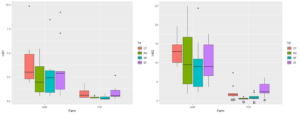
This project aimed to compare four termination methods for winter rye cover crops – conventional tillage, strip tillage, occultation with silage plastic, and roller-crimping - for their impact on production of three vegetable crops: pepper, winter squash and fall cabbage. Trials were conducted on working organic vegetable farms and evaluated labor needs, weed populations, yields, and two measures of soil health and function, soil aggregate stability and water infiltration.
The COVID-19 pandemic delayed trial initiation – while rye cover crops and perennial living aisles were established in fall 2019, during 2020 the on-farm plots were managed by mowing (by participating farmers) and rye cover crops were re-established by researchers in fall 2020. This delay is likely to have contributed to higher populations of perennial weeds, mainly Canada thistle and quack grass, at all locations. This should be considered when evaluating trial results. Reduced tillage and no-till production methods are not well suited to control of perennial weeds, and we do not recommend that farmers attempt to use no-till methods in fields infested with perennial weeds.
Winter rye cover crops suppress weeds through their fall and spring growth, as aggressive competitors for nutrients and water, and with a thick mat of residue when terminated and left in place. A sparse stand of rye will not effectively suppress weeds. At two farms, rye biomass was well below the 10,000 lb/A rate needed for weed suppression. Along with the high population of perennial weeds, this likely contributed to high needs for hand weeding labor in no-till rye termination methods (roller crimping and silage plastic occultation). This unexpected challenge highlights the need for research into cover crop establishment with tools available to small-scale vegetable growers, accessible cover crop assessment tools for farmers, and “rescue” options for sparse cover crop stands other than tillage. We used landscape fabric, silage plastic, and rye straw as “rescue” mulches for the plots terminated with roller crimping. The fabric and plastic mulches effectively suppressed weeds but perennial weeds were not suppressed by rye straw.
Like any growers trialing new methods, our field crew had a learning curve to implementing reduced tillage methods, particularly silage plastic occultation. Because of this, labor needs in 2022 are probably more representative than those from 2021. In 2022, labor needs for early season establishment of vegetable crops in either roller-crimped or silage plastic-occulted plots were approximately double those for tilled plots. Weed management needs for the remainder of the season were comparable for conventionally-tilled, strip-tilled, and roller-crimped plots. At both locations, weed barriers placed over roller-crimped rye limited weeding needs to a narrow planting strip. Silage plastic-occulted plots required considerably more hand weeding than tilled plots, partly due to the spread of perennial weeds, and partly due to the difficulty of hand weeding through thick cover crop residue.
Performance of reduced tillage systems based on yield varied across farms and crops, but in general plants in conventional tillage systems were more productive. Pepper yields for strip-tilled plots at TOF in 2021 and at HMF in 2022 approached yields for conventionally-tilled plots. Similarly, winter squash yields in strip-tilled plots at both farms in 2022, and for cabbage at TOF in 2021 and both farms in 2022 approached yields for conventionally-tilled plots. Future research into yield potential in low- and no-till systems should consider nutrient needs and variety selection for these systems.
Soil aggregate stability was higher in plots managed with no-till treatments (roller crimped and silage plastic-occulted) for two years than in conventionally-tilled plots at both farms, with aggregated from strip-tilled plots showing intermediate stability. Water infiltration was significantly more rapid in plots managed with no-till treatments for two years than in strip-tilled plots at TOF, with conventionally-tilled plots showing intermediate infiltration rates. Due to heavy rains prior to water infiltration tests at HMF, no significant differences in water infiltration were seen. Improvements in these measures of soil function after only two years of no-till management are encouraging.
Education
This project used a Community of Practice framework to promote peer-to-peer learning. Communities of Practice (CoP) are networks of people with mutual activities or interests, characterized by three dimensions - mutual engagement, joint enterprise and shared repertoires - that facilitate knowledge building and learning through shared practice. Studies of farmer networks using a CoP framework suggest that farmers belonging to CoPs who also accessed knowledge from a variety of sources were more empowered to innovate. We anticipated that a CoP on reduced tillage in vegetable production will catalyze increased innovation by organic vegetable growers seeking to increase resilience to extreme weather.
Farmers were connected through a listserv, online meetings, and on-farm field days. Farmers with expertise in reduced tillage vegetable production systems shared their knowledge through invited presentations and question-and-answer sessions at online meetings, field days, and conferences. By connecting farmers interested in the role of reduced tillage in climate resilience of organic vegetable production with practitioners who are known and trusted in the organic vegetable farming community, and who can provide detailed and specific information about their systems, this project facilitated knowledge and information exchange among farmers (Objective 1a). Additionally, this project used a co-creation of knowledge approach by supporting farmers in documenting and evaluating their current and evolving production systems (Objective 1b). Connections with researchers and Extension educators focused on soil health, and with staff from farmer-serving organizations that promote problem-solving through cohort-based planning and on-farm research, have provided opportunities to learn in a supportive group of peers.
Project Activities
Educational & Outreach Activities
Participation Summary:
Farmer Community of Practice online meetings have generally been attended by 20-25 farmers. In 2020, we initiated the meeting series with discussions of reduced tillage farming systems and previous trials, and introduced the online forms for use by farmers to record details of their ongoing trials of reduced tillage methods. On July 23, Dana Jokela of Sogn Valley Farm led a discussion of reduced tillage trials conducted at his farm. On August 17, Kat Becker of Cattail Organics described reduced tillage practices and plans at her farm. In 2021, we hosted two meetings, one exploring on-farm experimentation at Three Sisters Community Farm with Jeff Schreiber and at Springdale Farm with Peter Seeley, and one focusing on problem-solving in organic vegetable no-till. We have since switched to winter meetings since more farmers are able to attend.
Meetings held from January to April 2022 featured Les Macare of Racing Heart Farm describing their system for planting into cover crops, Rufus Haucke of Keewaydin Farms describing his transition to a compost-based no-till system, Dylan Bruce of Circadian Organics discussing establishment of no-till beds, Lincoln Fishman of Sawyer Farms (MA) describing a vegetable production system using perennial white clover, and Gilad Buzi of Aurora Del Camp Farm (Spain) describing his system to mechanize medium scale reduced tillage vegetable production.
Meetings held from December 2022 to March 2023 featured Jamie Patton of the University of Wisconsin Nutrient and Pest Management Program discussing principles of nutrient management in reduced tillage systems; Tony Ends of Scotch Hill Farm discussing his SARE-funded research into cut-and-carry mulch systems; Jimmy Bauman of Farm Farm discussing nutrient management in deep compost mulch systems; and Rue Genger discussing collaborative on-farm research approaches for reduced tillage systems.
Meetings held in October and December 2023 featured Seth Riley, Jennica Skoug, and Ruthanna Hutton-Okpalaeke describing low-till vegetable production at the Farley Center Farm Incubator, and Emma Link describing Practical Farmers of Iowa’s on-farm participatory trial network.
Recordings and notes from these meetings are at sites.google.com/view/climate-resilience-for-organic/events and on our YouTube channel at youtube.com/@climateresilientorganicveg3258.
Field days
In July 2023, we hosted a field day at Blue Moon Community Farm which featured research on rye cover crop termination, and included a demonstration of water infiltration assays and a farm field walk. In August 2023, we collaborated with Marbleseed to host a half-day field day at Circadian Organics, Ferryville WI, on reduced tillage vegetable production, featuring living mulch, occultation, and crimped rye systems in use at Circadian Organics, and demonstrating water infiltration assays and slake testing.
In June 2023, we hosted a field day at the West Madison Agricultural Research Station to demonstrate modifications to the small scale roller crimper designed by Dr. Ted Kornecki. Dr Kornecki joined us for this field day and explained the roller crimper design to a small group of attendees including invited representatives from a local agricultural machinery distributor.
In August 2021, we collaborated with Practical Farmers of Iowa to present a virtual field day on reduced tillage titled "Reduced-Tillage Research at the University of Wisconsin", featuring trials at High Meadow Farm. The webinar recording is available at https://practicalfarmers.org/2021/08/reduced-tillage-vegetable-production-web-series/.
Conference presentations
In 2023, Rue Genger presented on project Community of Practice activities at a one-day gathering of farmer-educators organized to discuss climate adaptation needs of Midwest organic and small-scale vegetable farmers (October 25, Cloquet MN), and at the Midwest Climate Resilience Conference (October 26-27, Duluth MN). We presented on research trial outcomes and CoP activities at three spring conferences: the Organic Vegetable Production Conference in Madison WI, Feb 3-4; the Marbleseed Organic Farming Conference in La Crosse WI, Feb 23-25, and the Agriculture for Tomorrow Conference in Escanaba MI, Mar 8. At OVPC, CoP members Les Macare (Racing Heart Farm) and Lincoln Fishman (Saywer Farms) joined the panel presentation, while at Marbleseed, CoP members Dylan Bruce (Circadian Organics) and Liz Dwyer (Dancing the Land) joined us. In addition to describing their reduced tillage systems, the four farmers contributed detailed information on their top two or three methods for reducing tillage in vegetable production to a handout distributed at the conferences.
In 2021, we facilitated a farmer-led workshop and roundtable at the Growing Stronger Collaborative Conference on Organic and Sustainable Farming (Feb 22-27 2021). Workshop panelists were farmer Dana Jokela, Sogn Valley Farm, farmer Ellen Drews, Astarte Farm, and consultant Jan-Hendrik Cropp, under_cover Consultancy. Panelists and over 100 farmers attended the roundtable session to continue discussion of reduced tillage systems for vegetable production.
We staffed a virtual exhibit booth at the online Practical Farmers of Iowa conference, Jan 21-23 2021, allowing us to share project information and resources with attendees. At this booth, we shared a project overview (CROVP overview) and a handout on the roller crimper that will be used in on-farm research (Small scale roller crimper). These handouts were also shared at the MOSES Organic Farming Conference in February 2022, at the FairShare CSA Coalition, eOrganic and North Central SARE Exhibit Hall booths.
Other activities
In 2022, we collaborated with Natalie Hoidal (University of Minnesota Extension) and Ben Phillips (Michigan State University Extension) to record three episodes for The Vegetable Beet podcast, featuring farmers who use reduced tillage methods: Jimmy Bauman of Farm Farm, Princeton MN; Kevin Anderson and Annelie Livingston-Anderson of Good Turn Farm, Stockholm WI; and Liz Dwyer of Dancing the Land, Clearwater MN. Podcast episodes are available at https://www.glveg.net/listen.
In June 2022, we visited the Urban Triage Agriculture Program site at the Farley Center farm incubator in Verona WI. The program director, Ruthanna Hutton-Okpaleake, is implementing reduced tillage methods for vegetable production for the Supporting Healthy Black Agriculture cohort program. We used our small scale roller-crimper to terminate a spring oat-pea cover crop which the Urban Triage team then covered with silage plastic. This field was used for vegetable production in 2023.
In 2023, Rue Genger began participating in the Midwest Vegetable Grower's Network's climate resilience working group.
Learning Outcomes
- Reduced tillage strategies for small-scale, diversified organic vegetable production
- Environmental and production system impacts on success of diverse strategies for reducing tillage
- Farmer-tested equipment, tools, and supplies for reducing tillage in small-scale diversified organic vegetable production
- Management of soil health and nutrients in reduced tillage production systems
Project Outcomes
Diverse cover crop mixes for semi-permanent living aisles (rather than rototilling to control weeds)
No-till termination of rye cover crops before vegetable production
No-till occultation of planting beds with black plastic or landscape fabric before fall vegetable crop planting
Landscape fabric as aisle ground cover (rather than rototilling to control weeds)
